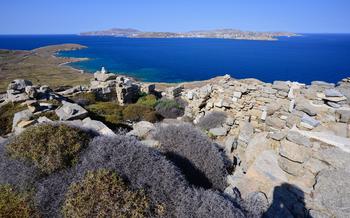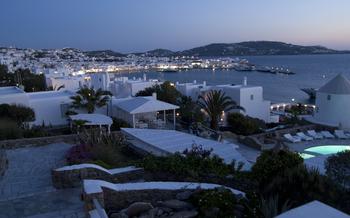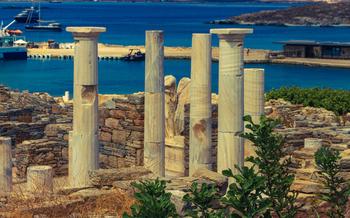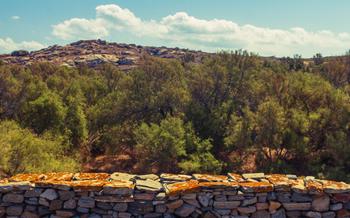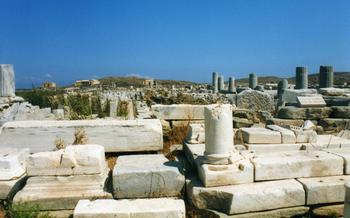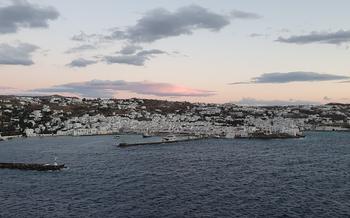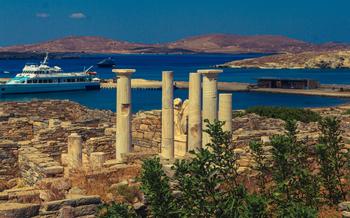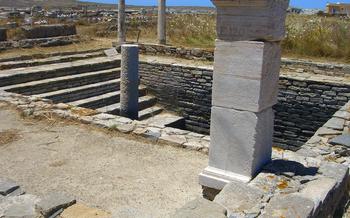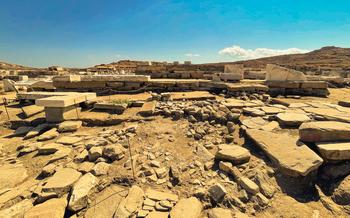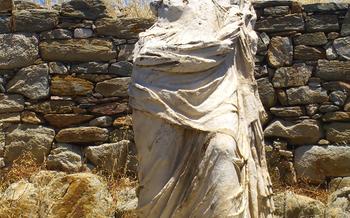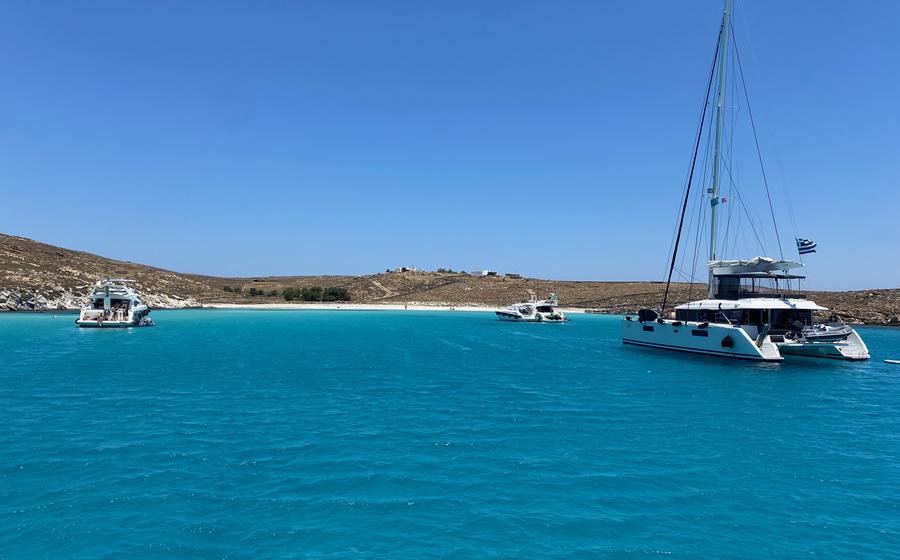
Rineia Island
- Rineia Island: A Hidden Gem in the Aegean Sea
- Step Back in Time: Exploring the Ancient Ruins
- Discover the Archaeological Museum
- Immerse Yourself in Nature's Beauty
- Visit the Sacred Lake
- Pay Homage at the Temple of Apollo
- Witness the Sunset from Mount Kynthos
- Delve into the History of the Sacred Way
- Explore the Ancient Theater
- Uncover the Secrets of the House of Dionysus
- Enjoy a Traditional Greek Meal
- Take a Boat Tour to Nearby Islands
- Shop for Local Handicrafts and Souvenirs
- Insider Tip: Plan Your Visit During the Off-Season
Rineia Island: A Hidden Gem in the Aegean Sea
In the heart of the Aegean Sea, nestled between the famous islands of Mykonos and Delos, lies a hidden gem known as Rineia Island. Steeped in ancient history and blessed with breathtaking natural beauty, Rineia beckons travelers seeking tranquility, exploration, and a glimpse into the cradle of Western civilization.
Once a thriving port city and a sacred sanctuary in ancient times, Rineia has evolved into an uninhabited island, its ruins and landscapes whispering tales of a bygone era. A visit to Rineia offers a unique opportunity to step back in time, explore archaeological wonders, immerse yourself in nature's embrace, and discover the secrets of a forgotten world.
Whether you're a history buff, a nature enthusiast, or simply seeking an escape from the bustling crowds, Rineia Island is a destination that will capture your heart and leave you with unforgettable memories. It's a place where ancient echoes mingle with the whispers of the wind, where natural beauty unfolds in every corner, and where the spirit of exploration ignites.
Step Back in Time: Exploring the Ancient Ruins
Rineia Island is home to the ancient city of Delos, a UNESCO World Heritage Site renowned for its well-preserved ruins and historical significance. Delos was once a sacred sanctuary and a major religious center in the ancient Greek world, dedicated to the worship of Apollo, the god of music, poetry, and prophecy.
As you wander through the ruins, you'll be transported back in time to the bustling streets and temples of ancient Greece. Must-see archaeological sites include the Terrace of the Lions, a row of imposing marble lion statues that once guarded the sacred lake. These majestic creatures, carved with intricate detail, are a testament to the artistry and craftsmanship of the ancient Greeks.
Exploring the ruins of Delos is not just about admiring impressive structures but also about understanding their importance in ancient Greek culture. Each site tells a story, providing a glimpse into the religious beliefs, rituals, and everyday life of the people who inhabited this sacred island. Take your time to wander through the ruins, absorb the atmosphere, and let your imagination run wild as you envision the city's vibrant past.
Discover the Archaeological Museum
The Archaeological Museum of Delos is a treasure trove of ancient artifacts that offers a fascinating glimpse into the history and culture of the island. Established in 1904, the museum houses an impressive collection of statues, pottery, jewelry, and other objects excavated from the ancient city.
Among the highlights of the museum's collection is the famous "Winged Victory of Samothrace," a majestic marble statue that once stood atop a ship's prow. The museum also boasts a remarkable collection of marble lions, which once lined the Sacred Way, the ancient processional path leading to the Sanctuary of Apollo.
The Archaeological Museum of Delos plays a crucial role in preserving and showcasing the rich cultural heritage of the island. Its exhibits provide valuable insights into the daily lives, religious practices, and artistic achievements of the ancient Greeks. By exploring the museum's collection, visitors can gain a deeper understanding of the rich history and enduring legacy of Delos.
Immerse Yourself in Nature's Beauty
Rineia Island is a treasure trove of natural wonders, offering a diverse range of flora and fauna that will captivate nature enthusiasts. Explore the island's unique ecosystem, home to rare and endangered species of plants and animals. Embark on scenic hiking trails that wind through lush vegetation, leading to breathtaking viewpoints and hidden coves. Indulge in birdwatching, as the island serves as a sanctuary for a variety of migratory birds. Dive into the crystal-clear waters for a refreshing swim or snorkel amidst vibrant coral reefs teeming with marine life. Discover the unspoiled beauty of Rineia's natural landscapes, where tranquility and adventure intertwine.
Visit the Sacred Lake
Steeped in history and mythology, the Sacred Lake on Rineia Island holds a unique allure for visitors. According to ancient Greek legends, the lake was once a place of purification and healing, where pilgrims would bathe in its waters to cleanse themselves of impurities. The lake's serene beauty and mystical aura have drawn visitors for centuries, and it remains a popular spot for those seeking a tranquil escape or a connection to the island's rich past.
Surrounded by lush vegetation and towering cliffs, the Sacred Lake offers a breathtaking natural setting. Its crystal-clear waters shimmer in the sunlight, reflecting the vibrant colors of the surrounding landscape. Visitors can take a refreshing dip in the lake's cool waters or simply relax on its shores, soaking up the tranquility of the surroundings.
In ancient times, the Sacred Lake was believed to have healing properties, and it was often used for religious rituals and ceremonies. Pilgrims would come from far and wide to bathe in its waters, seeking purification and renewal. The lake's sacred status is still acknowledged today, and many visitors choose to visit it as a place of spiritual reflection or meditation.
Whether you're interested in history, mythology, or simply seeking a serene natural retreat, the Sacred Lake is a must-visit destination on Rineia Island. Take a moment to soak up its beauty, immerse yourself in its history, and let its tranquil waters wash away your worries.
Pay Homage at the Temple of Apollo
The Temple of Apollo stands as a testament to the grandeur and religious significance of ancient Greece. Constructed in the 6th century BC, this Doric temple was dedicated to Apollo, the god of music, prophecy, and healing. Its imposing columns and intricate sculptures showcase the architectural prowess of the ancient Greeks.
As you approach the temple, you'll be awestruck by its sheer size and majesty. The temple's facade is adorned with exquisitely carved reliefs depicting scenes from Greek mythology, including the birth of Apollo and Artemis. Step inside, and you'll be greeted by a serene and sacred atmosphere. The temple's interior once housed a colossal statue of Apollo, which was considered one of the Seven Wonders of the Ancient World.
Take some time to explore the temple's surroundings. To the north, you'll find the ruins of the ancient city of Delos, with its theaters, temples, and marketplaces. To the south, you'll see the Sacred Lake, a mystical body of water that was considered sacred to Apollo.
Visiting the Temple of Apollo is a profound experience that transports you back in time to the heart of ancient Greek civilization. Whether you're a history buff, an architecture enthusiast, or simply someone who appreciates beauty, this temple is a must-see destination.
Witness the Sunset from Mount Kynthos
As the sun begins its descent, casting a warm glow over the Aegean Sea, make your way to Mount Kynthos, the highest point on Rineia Island. The panoramic views from the summit are simply breathtaking, offering a bird's-eye perspective of the entire island, the neighboring islands, and the vast expanse of the sea.
Capture the mesmerizing beauty of the sunset as the sky transforms into a canvas of vibrant hues, from golden yellow to deep orange and crimson. The play of colors against the backdrop of the ancient ruins and the sparkling sea creates a truly magical atmosphere.
In Greek mythology, Mount Kynthos was associated with Apollo, the god of music, poetry, and prophecy. It was believed that Apollo would often visit the mountain to seek inspiration and commune with nature. As you stand atop Mount Kynthos, let your imagination wander back in time and envision the ancient Greeks paying homage to their gods and goddesses in this sacred place.
Delve into the History of the Sacred Way
The Sacred Way, a path paved with marble, holds immense historical significance. It served as the main artery connecting the port to the Sanctuary of Apollo. This ancient route witnessed processions, rituals, and festivals that were central to the religious life of Delos. As you traverse the Sacred Way, you'll encounter remnants of ancient structures, including stoas, altars, and inscriptions that provide glimpses into the spiritual practices of the past. Take your time to explore this sacred path and imagine the vibrant religious ceremonies that once took place here.
Explore the Ancient Theater
Step into the Realm of Ancient Performances
Nestled amidst the historical wonders of Rineia Island, the ancient theater stands as a testament to the vibrant cultural heritage of ancient Greece. Built in the 3rd century BC, this impressive structure played a pivotal role in the lives of the island's inhabitants, serving as a venue for theatrical performances, religious ceremonies, and civic gatherings.
As you approach the theater, its grandeur unfolds before your eyes. Constructed from local marble, the theater features a well-preserved circular orchestra, surrounded by tiers of stone seats that could accommodate up to 5,000 spectators. Imagine the atmosphere as the theater filled with an eager audience, ready to be captivated by the performances that graced this stage.
Take a moment to admire the intricate architectural details that adorn the theater. The stage building, known as the skene, features three elaborately decorated doorways, each serving as an entrance for the actors. The proscenium, the wall that separates the stage from the orchestra, is adorned with reliefs depicting scenes from Greek mythology, adding a touch of artistic grandeur to the theater's ambiance.
While the theater is no longer in use for its original purpose, its legacy lives on. Every summer, the theater comes alive once again as part of the Delos Festival, a prestigious cultural event that brings together renowned artists from around the world to perform ancient Greek dramas and concerts in this evocative setting.
Attending a performance at the Delos Festival is a truly immersive experience, transporting you back in time to the era when theater was a vital part of Greek society. As you sit among the ancient stone seats, surrounded by the breathtaking scenery of Rineia Island, you can't help but feel a connection to the past, witnessing the enduring power of art and culture.
Uncover the Secrets of the House of Dionysus
Among the many ancient ruins on Rineia Island, the House of Dionysus stands out for its exceptional beauty and historical significance. Believed to have been the residence of a wealthy family during the Hellenistic period, the house is adorned with exquisite mosaics and frescoes that depict scenes from Greek mythology, including the birth of Dionysus, the god of wine and revelry.
These intricate artworks, which have been remarkably preserved over the centuries, offer a glimpse into the artistic prowess and cultural beliefs of the ancient Greeks. The mosaics feature vibrant colors and detailed depictions of mythological figures, while the frescoes showcase a mastery of narrative storytelling.
Exploring the House of Dionysus is a journey through time, transporting visitors back to an era of opulence and grandeur. The house's well-preserved condition allows visitors to imagine the daily lives of its inhabitants and the lavish parties and celebrations that may have taken place within its walls.
For those interested in ancient Greek art and culture, the House of Dionysus is a must-visit. It provides a unique opportunity to admire the artistic achievements of the ancient world and gain a deeper understanding of the beliefs and practices of the people who once called Rineia home.
Enjoy a Traditional Greek Meal
Indulge in the culinary delights of Rineia by savoring the authentic flavors of traditional Greek cuisine. The island boasts several charming tavernas where you can relish mouthwatering dishes prepared with fresh, local ingredients. From succulent grilled meats and seafood to hearty stews and flavorful salads, the culinary scene here is sure to tantalize your taste buds.
One must-try dish is the iconic moussaka, a delicious casserole made with layers of eggplant, potatoes, and minced meat, topped with a creamy béchamel sauce. For seafood enthusiasts, the grilled octopus is a must-order, offering a tender and flavorful taste of the sea. Don't miss out on the opportunity to sample traditional Greek appetizers, such as tzatziki, a refreshing yogurt dip with cucumber and garlic, or melitzanosalata, a smoky eggplant spread.
To fully immerse yourself in the Greek dining experience, pair your meal with a glass of local wine. The island's vineyards produce excellent vintages, ranging from crisp whites to robust reds. Whether you prefer a light and fruity Assyrtiko or a full-bodied Agiorgitiko, you'll find the perfect complement to your meal.
When choosing a restaurant, look for tavernas that are frequented by locals. These hidden gems often offer the most authentic and delicious dishes. Be sure to ask for recommendations from your hotel concierge or fellow travelers to discover the best culinary spots on the island.
Take a Boat Tour to Nearby Islands
Enrich your Mykonos experience by venturing beyond Rineia's shores and exploring neighboring islands that offer unique attractions and landscapes. Island hopping is a popular activity, allowing you to discover the diverse beauty of the Aegean Sea.
One must-visit destination is Delos, a small island located just a short boat ride from Rineia. Delos holds immense historical and mythological significance as the birthplace of Apollo and Artemis, the twin gods of Greek mythology. Explore the ruins of the ancient city, including the Temple of Apollo, the Terrace of the Lions, and the House of Dionysus.
For a more secluded experience, head to Rhenia, a tranquil island known for its pristine beaches, crystal-clear waters, and rugged landscapes. Spend a day swimming, sunbathing, and exploring the island's hidden coves.
To plan your boat tour, several options are available. You can book a guided tour from Mykonos, which typically includes transportation, a knowledgeable guide, and stops at multiple islands. Alternatively, if you prefer a more independent experience, rent a private boat and set your own itinerary.
Remember to pack essentials such as sunscreen, a hat, and swimwear. Check the weather forecast before your trip, as weather conditions can change quickly in the Aegean Sea. Embrace the opportunity to immerse yourself in the beauty and history of the surrounding islands, creating memories that will last a lifetime.
Shop for Local Handicrafts and Souvenirs
Rineia offers a treasure trove of unique handicrafts and souvenirs that reflect the island's rich history and culture. Explore the local markets and shops to discover an array of handmade items, from intricate pottery and woven textiles to traditional jewelry and religious icons. Each piece tells a story, showcasing the skills and artistry of the local artisans.
One of the must-visit shops is the Rineia Handicraft Cooperative, where you can find a wide selection of handmade products created by local craftsmen and women. From delicate lacework and embroidered linens to hand-painted ceramics and wooden carvings, there's something for every taste and budget.
If you're looking for unique jewelry, head to the Goldsmith's Workshop, where skilled artisans create exquisite pieces using traditional techniques. Browse the intricate gold and silver necklaces, earrings, and bracelets, each adorned with precious stones or delicate filigree work.
For those who appreciate religious iconography, the Icon Museum is a must-visit. Here, you'll find a collection of beautifully painted icons depicting scenes from the Bible and the lives of the saints. These intricate works of art are not only visually stunning but also hold deep religious and cultural significance.
Remember to embrace the local custom of bargaining when shopping in Rineia. It's a friendly and respectful way to interact with the vendors and often leads to a good deal. Don't be afraid to ask questions about the products and the artisans who made them. Your curiosity and appreciation will be welcomed and may even lead to a deeper connection with the local culture.
Insider Tip: Plan Your Visit During the Off-Season
While Rineia is a popular destination during the summer months, consider planning your visit during the shoulder season (April-May or September-October) or even in the winter (November-March). During these times, you'll encounter fewer crowds, lower prices, and a more relaxed atmosphere.
The off-season offers a unique opportunity to experience the island's charms without the hustle and bustle of peak season. You can explore the ancient ruins, hike the scenic trails, and visit the museum at your own pace. Plus, with fewer tourists around, you'll have a better chance of capturing stunning photos of the island's landscapes and landmarks.
To make the most of your off-season trip, consider booking your accommodation in advance, as some hotels and restaurants may have reduced hours or be closed during this time. Additionally, check the weather forecast before your visit, as the weather can be unpredictable, especially during the winter months.
Overall, visiting Rineia during the off-season is a great way to enjoy a more authentic and intimate experience of this beautiful island. Embrace the slower pace, connect with the locals, and discover the hidden gems that Rineia has to offer.
